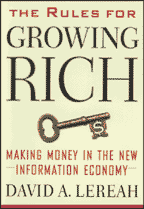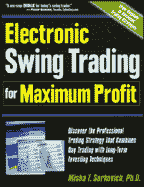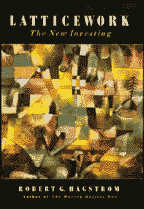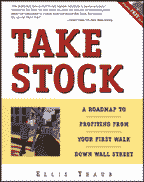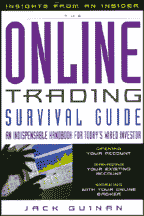
|
 The Online Trading
Survival Guide (236 pages, $18.95 softcover, 2000, ISBN 0793139627),
by Jack Guinan, published by Dearborn Trade. Whether you trade once
a year, or once a month, or once every minute, this is your guide to ensuring
that you do it right. The author is an industry insider who has spent years
working one-on-one with online brokerage customers, and through this book,
often answers investors' needs before they make their first trade. From
opening an account to how trades work, he encourages investors to master
online brokerage basics. Investors will also learn how to understand the
mechanics of getting orders filled, how to avoid trading errors, and how
to work with their brokers.
Dearborn Trade The Online Trading
Survival Guide (236 pages, $18.95 softcover, 2000, ISBN 0793139627),
by Jack Guinan, published by Dearborn Trade. Whether you trade once
a year, or once a month, or once every minute, this is your guide to ensuring
that you do it right. The author is an industry insider who has spent years
working one-on-one with online brokerage customers, and through this book,
often answers investors' needs before they make their first trade. From
opening an account to how trades work, he encourages investors to master
online brokerage basics. Investors will also learn how to understand the
mechanics of getting orders filled, how to avoid trading errors, and how
to work with their brokers.
Dearborn Trade
A Kaplan Professional Company
155 N. Wacker Drive
Chicago, IL 60606-1719
US orders: 800 829-7934
international orders: Dallas French, 312 836-4400
fax 312 836-1021
www.dearborn.com
BACK TO LIST |


